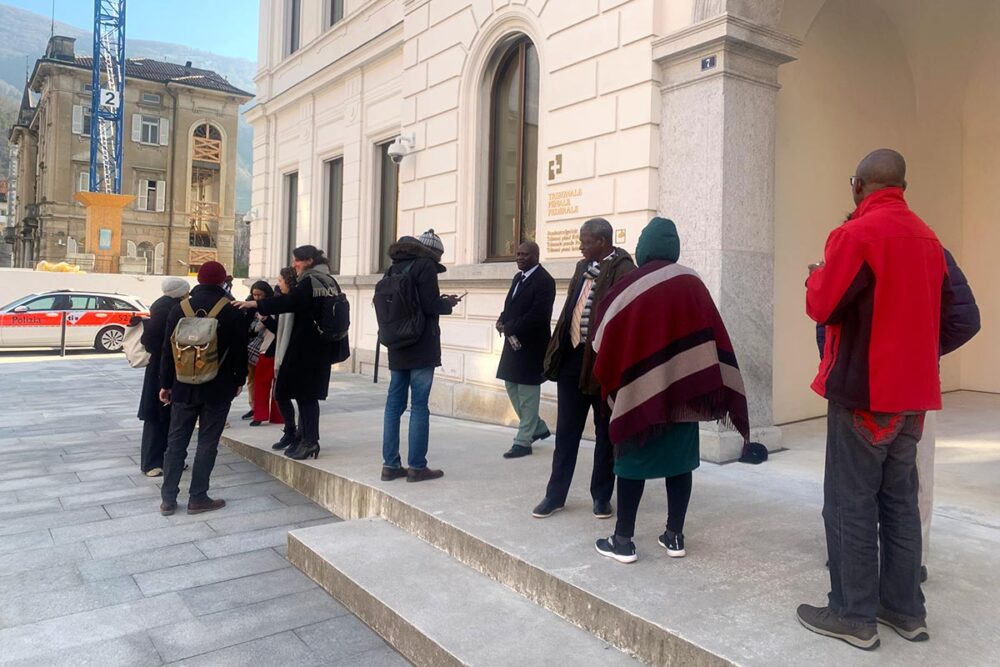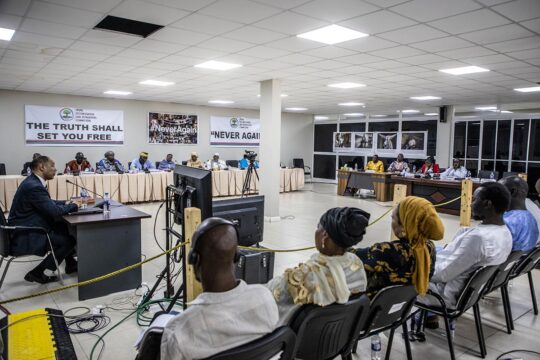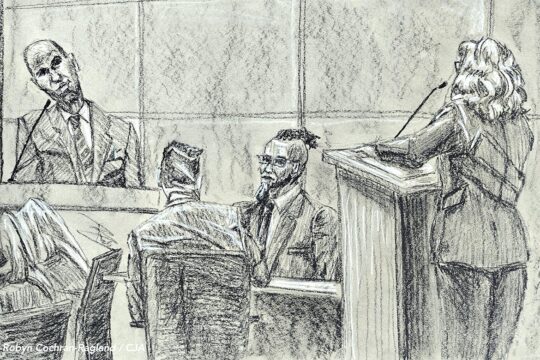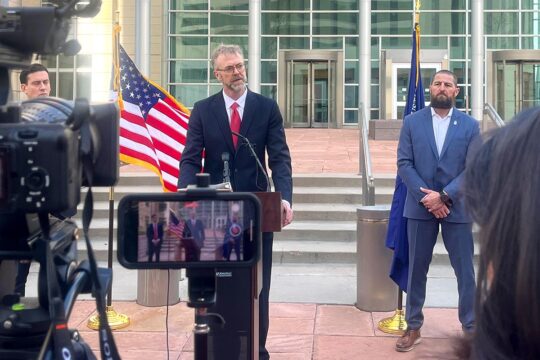"Something became increasingly clear towards the end of the criminal investigation: there seemed to be two faces of Ousman Sonko," prosecutor Sabrina Beyeler said on March 4 when the Swiss Federal Court of Bellinzona resumed the crimes against humanity trial of the former Gambian interior minister. "One face shows an intelligent, attentive, courteous and cooperative suspect who knows of no wrongdoing and has never been guilty of anything. The other face shows a person who was aware of everything from A to Z, who knew about the systematic human rights violations and helped orchestrate them at the highest level, a “mastermind”, a cool, considered planner and strategist, someone without scruples, who was selfish, ambitious, an alpha male, a person of power who wants to control the situation at all times and hold all the strings."
During the proceedings, she told the court, they were shown the following side of the accused: "He claims and defends himself that there was no state repression, killings, torture or rape in Gambia. Rather, he says that it was – and these were the words of the defense – a tourist paradise. Not at all. Such a statement is tasteless and misplaced. It ignores all of the revelations that have become internationally known in recent years about the machinations of Yahya Jammeh [president of The Gambia from July 1994 to January 2017] and his followers. The accused wants to present himself as a reformer and law-abiding public servant and claims that there have been many improvements under Yahya Jammeh."
In the prosecutor’s view the handwritten notes found with the accused when he was arrested in 2017 demonstrate that Sonko knew everything. "These memos also show that the accused was well able to resist instructions from the president."
Killing Manneh, the most serious crime
For the prosecutor, the accused´s involvement in the murder of Almamo Manneh is the highest crime he allegedly committed. Manneh was a state guard soldier and one Jammeh´s most loyal men. Before the Gambia's truth commission (2018-2021), he was implicated to have participated in a number of tortures. In 2000 however, Manneh himself suffered a similar fate as many of Jammeh´s close allies. He was killed. However, Sonko refused to respond to questions on this issue. "I am bound by an oath of secrecy," he always responded, even though he denied the allegation.
"The Office of the Attorney General considers that the involvement of the accused as an accomplice is more than sufficiently proven. As commander of the State Guard, the accused led the group of five to six soldiers. All soldiers acted under his command, i.e. they carried out the orders as they had been planned and ordered by the accused. He himself acted as part of this group and actively participated by shooting the fleeing Almamo Manneh with his own weapon. It was clear to the accused, and also the objective, that Almamo Manneh would not be arrested but liquidated as an enemy of the State," the prosecutor argued.
In her argument, she told the court Sonko used his professional connection with Manneh to lure him into an ambush. "The accused," she added, "acted with the soldiers as a kind of 'death squad' and was prepared to eliminate any person who was [against] the regime, outside legal rights. A single human life didn't matter to him, it was too insignificant compared to the government's selfish interests in staying in power. The killing is therefore to be qualified as a serious case because perpetrators acted cruelly."
Addressing Binta Jamba’s rape
The prosecutor then touched on all the other crimes. "The army was active as part of this [group of] perpetrators in the context of attempted coups, among other things. The perpetrators' collective also acted together to prevent the prosecution of these crimes by covering these state crimes with a cloak of silence, falsifying or destroying incriminating evidence and publicly covering up the true facts with untrue statements. This collective of perpetrators acted together in an organised and coordinated manner in the crimes against Bunja Darboe, Ramzia Diab, Demba Dem, Musa Saidykhan and Madi Ceesay, Baba Jobe, Solo Sandeng, Nokoi Njie, Modou Ngum, Fatou Camara, Fatoumatta Jawara and Modou Touray," the prosecutor continued, naming all the individual victims in the case.
Binta Jamba, the widow of Manneh testified to being raped by Sonko multiple times over several years after her husband´s murder. Sonko denied it and said that during that period, from January 2000 to January 2002 he was in a neighbouring country, Sierra Leone, on a peace mission. Jamba´s statements "show a sufficient number of different real indicators to conclude that her statements are true and that the events took place as she described them," the prosecutor pleaded. "If one compares the statements made by Binta Jamba in the course of the pre-trial proceedings and before the court," she explained, "it is noticeable that she described the course of the core events the same way and with a high level of detail, even though she did not report on certain events chronologically per se… Various characteristics of the accused’s actions show that the crime against Binta Jamba were not primarily about the satisfaction of the accused’s sexual urges, but rather about the state interests of President Jammeh power apparatus, which the accused wanted to protec with his behaviour. One feature that stands out is the official appearance of the accused. He did not appear to Binta Jamba and the public as a private person in the moments in question, but as a representative of the army."
It took the prosecutor about six hours to make her pleadings before the three judges. Then she concluded: "In December last year, the Jungler Bai Lowe, who was involved in various crimes against humanity as a driver, was sentenced to life imprisonment [in a German court]. The defendant´s involvement in the offence and his culpability must be weighed significantly higher in this case…Taking all sentencing criteria into account, the Office of the Attorney General therefore requests that the accused be sentenced to life imprisonment."
“That's not fair”
When the closing argument of the prosecutor was shared in writing with the parties as Beyeler began addressing the judges, Sonko’s defense lawyer Philippe Currat asked the court for interpretation for his client. This was rejected. "That's not fair," Currat told the court. As a matter of fact, the defendant has to sit in court through long hours of pleadings about what his fate should be in a language he claims to not understand. Such is the Swiss court system, it turns out. Despite several submissions by the prosecution and defense, the bench, from the onset, has maintained that its only official language is German.
"The prosecution has begun its closing arguments, which will take all day. I have asked for my client to be able to benefit from either simultaneous or written translation, in order to understand what is required of him. The Court refused. When he is given the last chance to speak, he will only be able to say that he has understood nothing of what the Office of the Public Prosecutor of the Confederation and the plaintiffs' lawyers have said against him. As for the Gambian journalists who have once again made the trip, they are reduced to listening to days of pleadings that they do not understand a single word of. This is a sad spectacle from our courts, which clearly do not understand what is at stake in a trial conducted on the basis of universal jurisdiction," the defense lawyer wrote a few hours later on LinkedIn.
Sonko, looking more frail than a month ago, sat next to his lawyer, going through documents and mostly jotting something down. Only he and Currat are on the defense bench this time around. The other three members of the team, including Sonko’s daughter, are not present. "There is no point coming if you cannot understand the language. It's just going to be additional costs for nothing," Currat responded when asked by Justice Info.
So long, Gambian people!
In January, a little Gambian community formed in Bellinzona, the tiny capital of Ticino, the Italian part of Switzerland. Plaintiffs – Gambians living at home and others abroad – as well as a few Gambian journalists and others, met in the Swiss court every day for three weeks of evidence hearings. In March, the atmosphere has changed. This time around, the plaintiffs are not in court. They are missing the final pleadings, unable to afford the cost of coming twice. The fate of one of the highest-ranking alleged perpetrators in Gambia, a former interior minister, is being determined in a country thousands of kilometres away, yet there is very little trace of the Gambian people and very little effort being made to include them. Except for the defendant of course, and two Gambian journalists, including Justice Info’s correspondent, who have received financial support from a self-organized, generous group of Swiss citizens, there are no Gambians present.
Although the Gambian community struggled with the language barrier from the start, this month’s proceedings seem to exclude them even more than in January. "My experience this time is totally different from the January sessions. When plaintiffs and witnesses had to speak in languages, I understand. This time, the proceedings were conducted in German, making it extra hard for me to make sense of what is going on. Without any means for interpretation, I have to rely on online translation of the documents shared with me after the session to make sense of it. It is quite unproductive, time consuming and information is not timely delivered to us when our readers need real time updates about the proceedings," Sanna Camara, a Gambian journalist covering the trial, said.







